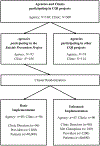Zero suicide implementation-effectiveness trial study protocol in outpatient behavioral health using the A-I-M suicide prevention model
- PMID: 33220488
- PMCID: PMC7887031
- DOI: 10.1016/j.cct.2020.106224
Zero suicide implementation-effectiveness trial study protocol in outpatient behavioral health using the A-I-M suicide prevention model
Abstract
Background: The treatment of suicidal patients often suffers owing to a lack of integrated care and standardized approaches for identifying and reducing risk. The National Strategy for Suicide Prevention endorsed the Zero Suicide (ZS) model, a multi-component, system-wide approach to identify, engage, and treat suicidal patients. The ZS model is a framework for suicide prevention in healthcare systems with the aspirational goal of eliminating suicide in healthcare. While the approach is widely endorsed, it has yet to be evaluated in a systematic manner. This trial evaluates two ZS implementation strategies statewide in specialty mental health clinics.
Methods/study design: This trial is the first large-scale implementation of the ZS model in mental health clinics using the Assess, Intervene, and Monitor for Suicide Prevention (A-I-M) clinical model. Using a hybrid effectiveness-implementation type 1 design, we are testing the effectiveness of ZS implementation in 186 mental health clinics in 95 agencies in New York State. Agencies are randomly assigned to either: "Basic Implementation" (BI; a large group didactic learning collaboratives) or "Enhanced Implementation" (EI; participatory small group learning collaboratives; enhanced consultation for site champions). Primary outcomes include suicidal behaviors, hospitalizations and Emergency Department visits; implementation outcomes include protocol adoption, protocol fidelity and barriers/facilitators to implementation.
Discussion: This project has the potential to have a significant public health impact by determining the effectiveness of the ZS model in mental health clinics, a setting where suicide attempts and suicides occur at a higher rate than any other healthcare setting. It will also provide guidance on the implementation level required to achieve uptake and sustainability of ZS.
Trial registration: N/A.
Keywords: Effectiveness; Hybrid trial; Implementation; Learning collaborative; Outpatient mental health; Suicide prevention; Zero Suicide.
Copyright © 2020 Elsevier Inc. All rights reserved.
Conflict of interest statement
Competing Interests
The authors declare that they have no competing interests. Drs. Brown and Stanley receive royalties for the commercial use of the C-SSRS from the Research Foundation for Mental Hygiene, Inc.
Figures
Similar articles
-
The Relationship Between Suicidal Behaviors and Zero Suicide Organizational Best Practices in Outpatient Mental Health Clinics.Psychiatr Serv. 2021 Oct 1;72(10):1118-1125. doi: 10.1176/appi.ps.202000525. Epub 2021 Mar 18. Psychiatr Serv. 2021. PMID: 33730886 Free PMC article.
-
"Zero Suicide" - A model for reducing suicide in United States behavioral healthcare.Suicidologi. 2018;23(1):22-30. Suicidologi. 2018. PMID: 29970972 Free PMC article.
-
A suicide prevention strategy for youth presenting to the emergency department with suicide related behaviour: protocol for a randomized controlled trial.BMC Psychiatry. 2020 Jan 14;20(1):20. doi: 10.1186/s12888-019-2422-y. BMC Psychiatry. 2020. PMID: 31937274 Free PMC article.
-
Communication-based suicide prevention after the first attempt. A systematic review.Psychiatriki. 2021 Apr 19;32(1):51-58. doi: 10.22365/jpsych.2021.003. Epub 2021 Mar 8. Psychiatriki. 2021. PMID: 33759809
-
Foundational skills in the assessment and management of suicide risk in neuropsychological practice.Clin Neuropsychol. 2024 Dec 2:1-19. doi: 10.1080/13854046.2024.2435543. Online ahead of print. Clin Neuropsychol. 2024. PMID: 39623289 Review.
Cited by
-
A cluster randomised effectiveness-implementation trial of an intervention to increase the adoption of PAX Good Behaviour Game, a mental health prevention program, in Australian primary schools: Study protocol.Contemp Clin Trials Commun. 2022 May 25;28:100923. doi: 10.1016/j.conctc.2022.100923. eCollection 2022 Aug. Contemp Clin Trials Commun. 2022. PMID: 35669488 Free PMC article.
-
A Statewide Evaluation of the Implementation of Evidence-Based Suicide Prevention Guidelines in Juvenile Detention Centers.Psychiatr Serv. 2024 Jul 1;75(7):678-688. doi: 10.1176/appi.ps.20220490. Epub 2024 Feb 19. Psychiatr Serv. 2024. PMID: 38369882 Free PMC article.
-
Suicide Risk Assessment, Management, and Mitigation in the Emergency Setting.Focus (Am Psychiatr Publ). 2023 Jan;21(1):8-17. doi: 10.1176/appi.focus.20220072. Epub 2023 Jan 16. Focus (Am Psychiatr Publ). 2023. PMID: 37205029 Free PMC article. Review.
-
Zero Suicide Model Implementation and Suicide Attempt Rates in Outpatient Mental Health Care.JAMA Netw Open. 2025 Apr 1;8(4):e253721. doi: 10.1001/jamanetworkopen.2025.3721. JAMA Netw Open. 2025. PMID: 40193074 Free PMC article.
-
Prototyping the implementation of a suicide prevention protocol in primary care settings using PDSA cycles: a mixed method study.Front Psychiatry. 2024 Jan 25;15:1286078. doi: 10.3389/fpsyt.2024.1286078. eCollection 2024. Front Psychiatry. 2024. PMID: 38333892 Free PMC article.
References
-
- Center for Disease Control and Prevention (CDCP). 2017. Fatal Injury Data. Web-based Injury Statistics Query and Reporting System (WISQARS) https://www.cdc.gov/injury/wisqars/fatal.html..
-
- CDCP, National Program of Cancer Registries (NCPR). CDC WONDER – United States Cancer Statistics http://wonder.cdc.gov/cancer.html..
-
- CDCP, Division for Heart Disease and Stroke (DHDSP). Data and Statistics http://www.cdc.gov/dhdsp/data_statistics/index.htm..
-
- Brown GK, Beck AT, Steer RA, Grisham JR. Risk factors for suicide in psychiatric outpatients: A 20-year prospective study. J Consult Clin Psychol. 2000; 68: 371–377. - PubMed
-
- Stanley IH, Hom MA, Joiner TE. Mental health service use among adults with suicide ideation, plans, or attempts: results from a national survey. Psychiatr Serv. 2015; 66: 1296–1302. - PubMed
Publication types
MeSH terms
Grants and funding
LinkOut - more resources
Full Text Sources
Other Literature Sources




